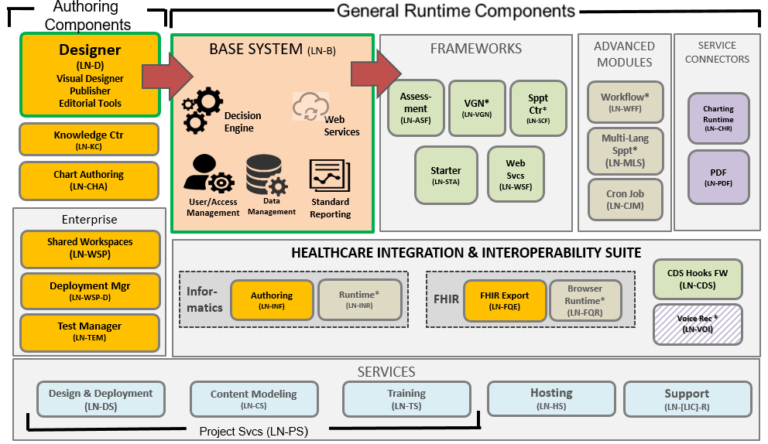Licensing & Deploying LogicNets Software
LogicNets software is typically licensed by organizations using the platform to create and deploy guidance applications or digital content or by organizations interested in turnkey content solutions. This article generally describes how LogicNets software is licensed and the options provided by LogicNets to enable and optimize deployment.

User Licenses
Most authoring components are licensed based on the number of “designer” or “content curator” users developing and maintaining applications. For application use cases supporting interactive human users, run-time components are most often licensed based on the number of end-users accessing the system. There are two options for user-based licensing – named user and concurrent user. Named user licensing provides specific users with a dedicated license to access independently only. Concurrent user licensing allows a set number of users to access applications on the LogicNets runtime instance concurrently. It allows for a much larger community of users that does not need to access the applications frequently to share capacity among fewer licenses. Generally, the price for concurrent licenses is six times that of named users. It is, therefore, economically more favorable to use named users if the average access and session duration is more than 4 hours per user per day. Named and concurrent licenses can be acquired and applied simultaneously to different user profiles within the same customer community.
Other Licensing Bases
When LogicNets is connected to external systems, additional licensing options often apply. Some components, such as those that process and deliver content for external processing, deliver substantial value that cannot be measured directly by LogicNets. As a result, LogicNets licenses these components at a fixed price per customer organization or LogicNets installed instance. Our turnkey Content Solutions, designed to provide comprehensive support when external systems and not specific interactive users are the beneficiaries of runtime usage, are a testament to our commitment to delivering value. Finally, LogicNets offers a range of use case-oriented license bundles and enterprise licensing options. Please contact LogicNets at sales@logicnets.com to discuss these options.
Add-On Professional Services
Because the LogicNets platform is extremely robust and offers a wide range of functionality, “designer” or “authoring” users will likely want to acquire various levels of training to learn about and take advantage of different levels of functionality. Customers should allocate training time for the staff they deploy to work in LogicNets with options to train staff in designing content, developing advanced use case infrastructure, production admin, and other topics. They may also wish to avail themselves of our comprehensive range of other LogicNets professional services – including design and deployment, content modeling, and other areas to meet their specific needs, ensuring they have the support and resources they need to succeed.
LogicNets Web-Based Architecture and Hosting Options
The LogicNets software is web-based and is designed to run on web hosting infrastructure where access 1) to human users is via their web browsers and 2) to systems is via web service calls. Customers acquire LogicNets software licenses that permit them to download and run the software on their own hosting infrastructure. LogicNets also provides “cloud” hosting infrastructure as an alternative option, in which LogicNets hosts the customer’s software licenses on their behalf for an additional fee. The “Base” LogicNets Cloud service is available to all customers to support application development and unit testing at no extra cost as part of the standard Software Support and Maintenance Program. LogicNets-provided cloud infrastructure for production and advanced testing activities is acquired at additional expenses and sized per customer to meet the unique requirements of each customer scenario.
